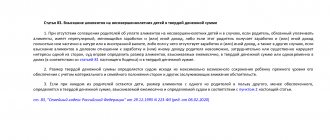Should the father pay child support?
Current Russian legislation provides for several types of alimony depending on the specific situation. The norms of family legislation provide for the obligation of parents to raise their children and also support them.
If one of the parents lives separately from the child, regardless of the fact of the parents’ divorce, then such parent is obliged to provide for his child by transferring alimony to him.
Types of parental support:
- Simple alimony – until the child is recognized as legally competent (usually until the age of 18)
- Alimony for the mother of the child – until the child reaches 3 years of age
- Alimony for the mother of the child - during pregnancy
- Alimony for the child’s parent – if the child is a group 1 disabled person (up to 18 years old)
It is important to consider that some types of alimony may be cumulative. So, for example, the mother of a child has the right to demand both simple child support and alimony for her personally since the child has not reached the age of 3 years.
Parental support payments
When collecting alimony in favor of parents, the child’s age and category of working capacity are taken into account. Alimony cannot be recovered from persons under 18 years of age or from children who have a disability category and are recognized as incapable of work due to age.
To receive alimony, parents must file a statement of claim, which reflects the fact of the child’s need for material payments.
Determining the amount of child support for the father requires taking into account a number of features. When considering a case in court, the judge pays attention to:
- on the child’s income level;
- on the marital status of the persons concerned;
- to help parents in addition to paying child support;
- on the financial situation of both parties.
As a final decision, the court has the right to oblige the child to pay child support to disabled or needy parents. The form of deductions can be expressed either in hard currency or in monthly alimony, depending on the child’s income.
When filing a claim against one child, other adult able-bodied children are brought in as defendants.
Amount of child support from the child's father
Taking into account the various life situations in which parents and their children may find themselves, the legislator has provided several ways to collect alimony
In a fixed amount of money
- in an amount equal to the parent’s share of income;
- mixed option: in a fixed amount of money and a share of income.
How much child support should a non-working father pay?
Based on the established methods of collecting alimony, if the child’s father does not have an official job or is unemployed, then alimony should be established in a fixed monetary amount.
The size of this amount corresponds to the minimum wage for a minor in a specific constituent entity of Russia. If the father of the child has another child, the amount of the fixed payment may be reduced.
Important : the very fact of the absence of a permanent source of income does not affect the possibility of collecting alimony in a fixed amount.
How much child support should a working father pay?
The maximum amount of alimony is not established by current legislation and is achieved by establishing alimony in the amount of the father’s share of earnings. The minimum amount is equal to the minimum wage for a minor in a particular region, as has already been indicated.
A working father can pay either a fixed amount or a share of income. In this situation. In this case, it is necessary to calculate how alimony will be collected to better provide for the child.
Determine what income the alimony payer may be hiding.
The list of income from which alimony must be paid is established by Government Decree No. 841 dated July 18, 1996:
- wage;
- salaries and payments to state and municipal employees, persons holding civil service positions, and deputies;
- fees in the media, art organizations, author's (production) remuneration;
- allowances and additional payments to salaries, additional payments for working conditions;
- remuneration for class teachers;
- payments to medical staff;
- bonuses and rewards, other payments to wages;
- all types of pensions, scholarships, unemployment and disability benefits;
- income of entrepreneurs, lessors, shareholders and company participants;
- amounts of financial assistance;
- maintenance and benefits for military personnel and internal affairs employees;
- earnings of convicts;
- and some others.
❌ It will not be possible to collect child support from a number of payments.
Alimony is not collected from income from one-time transactions (sale of a house, apartment, car, etc.).
Also, alimony is not collected from payments for compensation for damage to health, financial assistance from an employer in connection with the birth of a child, a wedding or death of loved ones, compensation for travel expenses, financial assistance to victims of terrorist attacks or natural disasters.
Maternity capital is also protected from foreclosure.
A complete list of such income is specified in Article 101 of the Federal Law “On Enforcement Proceedings”.
✔️ Decide in what form of alimony it will be more convenient for you to receive it.
In total, the law provides three options:
1) as a percentage of income according to the rules of Art. 81 RF IC:
- 1/4 per child;
- 1/3 for two children;
- 1/2 for three or more children.
This option is suitable if the payer has a stable official income. In our case, it seems that this method is no longer suitable.
2) in a fixed amount (Article 83 of the RF IC). This method is suitable for receiving income in foreign currency, unstable income, or entrepreneurial activity of the debtor. The court will determine the amount of alimony based on proven mandatory expenses for the child. As a rule, it will be measured as a multiple of the subsistence minimum (so that the bailiff then has no problems with indexing the amount of payment): 1.5 subsistence minimum, two, etc. For example, in Moscow, the cost of living per child from September 2021 was set at 15,225 rubles, in the Moscow region - 12,688 rubles.
3) mixed method - a combination of the two above options. Suitable if you have a stable source of income and an unstable one.
Does a father who has been deprived of parental rights pay child support?
Deprivation of parental rights does not in any way affect the father's obligation to provide for his child.
The fact of deprivation of parental rights does not allow the father to exercise his rights to participate in the life of the child, eliminates the need for his consent for the children to travel abroad, the possibility of the father legally taking the child to live with him, but nothing more.
Also, deprivation of parental rights does not deprive the child of the opportunity to be the heir of the deceased father.
In case of deprivation of parental rights of the father, the child's mother and other legal representatives of the minor have every right to demand payment of alimony in any form.
Control of living standards
According to the International Convention on the Rights of the Child, a minor has the right to be provided with a standard of living necessary for normal physical and mental development. It is natural that in this case this right becomes a responsibility placed on the shoulders of the parents.
In this regard, the father is also given the right to receive information about the child from educational and medical institutions, which issue it at the request of the parent. The mother also does not have the right to deprive the father of information about the child’s life, otherwise this may be regarded as concealment. After contacting the guardianship authorities, legal proceedings may begin not in favor of the spouse with whom the minor remains. As you can see, the rights of the father when paying child support allow him to significantly influence the lives of his children. But non-payment entails serious consequences, including criminal prosecution. Read more…
Collection of alimony from a minor father
In this case, there are three different options, depending on specific conditions:
- Both parents are recognized as fully capable (emancipated after 16 years) and are married
In this case, alimony can be collected on a general basis, since the child’s father is fully responsible for his actions independently, despite the fact that he has not actually reached the age of majority. The payer of alimony in this case will be the father of the child. The fact of paternity is established automatically.
- If the child’s parents are emancipated and were not married
In this case, the fact of paternity will have to be established in court according to the general principles of the relevant judicial proceedings. The mother of the child must apply to establish paternity. In this situation, alimony will also be collected from the father of the child.
- If the child's father was not emancipated
This situation is complicated by the fact that in addition to the need to conduct a genetic examination, it will be necessary to obtain consent from the minor father or his legal representatives to agree to conduct such an examination. As for alimony, it will be paid by the legal representatives of the minor father.
Communication with a child
When divorcing, spouses do not often compromise and do not agree in advance with whom the child will live.
Judicial practice shows that in most cases (90 percent) the judge leaves the child with the mother if the parents were unable to reach an agreement with each other. Over the past 20 years, this has already become an unspoken legal custom. However, fathers who want their children to live with them, with due diligence, always achieve their goal. If the baby remains with the mother, then she is obliged to provide her ex-husband with opportunities to communicate with the child. These are the rights of a father paying child support. During a divorce, the court reserves the right of the father to see and communicate with the child who remains to live with his ex-wife. Fathers do not always fulfill their parenting responsibilities after divorce. This is due not only to negligence in relation to children, but also to the mother’s desire to protect the child from communicating with the person who caused moral harm to her. This right is also guaranteed by the Family Code.
Can a mother prohibit a father from seeing her child? Yes, it can, but there must be good reasons for this:
- The father behaves immorally;
- The father is registered in a psychoneurological or drug dispensary;
- Experts have judicially recognized its negative impact on the child.
- An oral agreement is the optimal solution for those parents who have maintained normal relationships, that is, they are aware of joint responsibility for their common child. If you think that conflicts should not arise on this basis, then you can verbally discuss the order and time of meetings with your spouse.
- However, if there are suspicions that the child’s father will begin to abuse his right or begin to raise him “in his own way”, without discussing such issues with you, a formal written agreement should be concluded. According to Article 66, this agreement may also contain general rules for the upbringing and activities of the child with the other parent, that is, it covers an area broader than the formal time and place of meeting. In case of non-compliance with this agreement, it can be presented to the court as evidence for further legal resolution of the conflict.
However, in this case, the court will necessarily involve the guardianship and trusteeship authorities. Based on their observations, a decision will be made that may introduce unwanted adjustments. For example, indicate the possibility of meetings only in the presence of the mother. If the guardianship authorities do not reveal any violations, then the court will satisfy the father’s request without adjustments in the form in which the father requested. It is important to note that communication with a child means not only meetings, but also other forms of interaction, be it phone calls, letters or SMS.
Voluntary fulfillment by the father of the obligation to pay alimony
In addition to the forced collection of alimony, the child’s parents have the right to enter into an agreement on the payment of alimony by one of the parents.
This agreement must be concluded in notarial form. Such an agreement may contain any form of alimony payment (share of income, flat amount or a mixed version).
The fact of divorce is not necessary to conclude such an agreement. The parties have the right to establish any amount of alimony. If necessary, the child's mother has the right to go to court if the child's father refuses to fulfill or does not actually fulfill such an agreement.
Also, the child’s father has the right to pay alimony without concluding a notarial agreement. It is important to remember that in this case the father will have to prove in court the fact that the child transferred to the mother or other legal representative was intended specifically for the maintenance of the child. Without competent legal assistance, this is not always possible.
USEFUL : read more about the agreement on alimony payment at the link
What circumstances influence the increase in payments?
Generally speaking, the increase in alimony is influenced by everything indicating that the payer’s financial or family situation has improved. Examples of improved well-being :
- Official wages increased.
- The husband began to engage in entrepreneurial activity and achieved serious success in this.
- The man got a part-time job.
- The payer began to receive, in addition to wages, other income from which it is possible to make deductions (from what income and how is alimony calculated?).
- The husband’s parent, whom he supported on the basis of a child support agreement concluded with a relative, died.
- The child from his first marriage became an adult - there was no longer any need to pay him alimony.
Any improvement in the payer’s situation is grounds for trying to increase the amount of alimony.
Our website contains materials not only about increasing, but also about decreasing the amount of alimony. From them you will learn how to file a claim for a reduction in size, as well as how to do this if you have other children.
How to apply for child support for the father of a child?
In the absence of paternity, the first step is to go to court to recognize paternity. In this situation, the application for establishing paternity can be supplemented with a requirement for the collection of alimony. This will save time in establishing child support and will protect the interests of the child.
sssIf there is a fact of paternity, you should choose a method for collecting alimony. We mentioned this in more detail above.
The application for the collection of alimony must contain:
- Name of the court, information about the claimant and the child’s father, indicating their addresses and passport details;
- Specific circumstances of your situation: fact of paternity, date of divorce, father living separately from the child, confirmation of your expenses for the maintenance of the child;
- Links to legislation and judicial practice;
- The petition part, where you ask to establish a specific method of collecting alimony.
Important to remember:
- the alimony claimant has the right to submit a claim to the magistrate’s court at his place of residence;
- the state duty for this category of cases has not been established;
- the plaintiff must independently send to the alimony debtor a copy of the application with all attachments, and to the court - documents confirming such sending.
Complaints to the authorities: where to go if you don’t pay enough?
The main authority that resolves such issues is the court. You can go to court even when a woman is sure that her ex-husband is hiding income, but she has no evidence. Judges have the right to request salary certificates from the husband's employer, as well as certificates from the pension fund. If it is proven that real earnings have been concealed in order to evade paying alimony in full, administrative proceedings may be initiated against the ex-husband .
If alimony payments are not received at all, you need to contact the bailiff service with a writ of execution.
Starting from 2021, the FSSP must independently identify debtors, but this may take a lot of time.
To speed up the process, the recipient must pay a visit to this authority himself, and do not forget to take a copy of the writ of execution with him.
also apply for a writ of execution at the place of work of your ex-spouse. Like the FSSP, from 2021 the employer himself is obliged to transfer alimony if there is a court order, however, situations are different, and if benefits are not paid, you need to remind about this by contacting the accounting department or the human resources department in person.
Responsibility for failure to pay child support by father
If the child's parent fails to pay child support, you have the right to file an application for collection of child support in court. Based on the court decision, enforcement proceedings will be initiated, alimony will be paid forcibly at the expense of the debtor’s property.
If the child's father evades payment of alimony, you have the right to recover alimony from him for a certain time period when this alimony was not paid. In addition, current legislation provides for the possibility of collecting from a non-payer of alimony a penalty equal to 1/2 of the amount of debt for each day of delay.
Also, you have the right to demand that the bailiff prohibit the debtor from carrying out registration actions with his property and seize such property.
In case of malicious evasion of payment of alimony, criminal liability is provided up to imprisonment for up to 1 year.
USEFUL : about receiving arrears of alimony follow the link, and also watch the video
What to do if your ex-spouse makes small payments?
In order to build the correct procedure for increasing alimony benefits, it is necessary to understand on what basis these benefits were paid . There may be 3 options here:
- Alimony was paid voluntarily by oral agreement of the parties.
- Payments were made in accordance with a written agreement concluded between the parents and certified by a notary.
- Alimony was paid by court order.
If payments were made on the basis of an oral agreement, then you should also try to negotiate an increase in them verbally . If you present evidence of the need to increase payment, perhaps the alimony payer will not be against increasing the amount of alimony.
If alimony was paid on the basis of a written, notarized agreement, then in order to increase the amount of benefits, the parents will need to conclude a new agreement.
In a situation where payments were made by court decision, but their amount is insufficient to support the child, you can try to negotiate with the alimony payer for an additional amount. However, it is not always possible to reach an agreement peacefully. But if the husband pays little alimony, what to do? In this case, the way out of the situation may be to file a lawsuit in court.
Court as a way to resolve the issue
In order to file a claim in court, you must first collect all the necessary documents. There is no clear list of documents, since each situation is individual, but there is a basic list of papers that will definitely be useful for initiating legal proceedings, these are :
- A copy of the recipient's passport.
- Child's birth certificate.
- Marriage/divorce certificate.
- Documents that confirm expenses for the child.
- Certificate of income of the alimony recipient.
- Certificate of family composition.
- Statement of claim.
Before transferring documents to the judge, you will need to pay a state fee . With a receipt for payment and all documents, you can submit the case for review.
After the claim is considered, a decision and a writ of execution will be issued on it. According to this writ of execution, the alimony payer will have to pay benefits.
Indexation and its impact on the amount of payments
If the husband pays small alimony as a share of his salary, then the court can help in this situation. Most likely, they will oblige the child’s father to pay a fixed amount. When alimony is paid in a fixed amount, then with an increase in the cost of living, their amount should change proportionally . This issue is covered in detail in Article 117 of the RF IC and Federal Law-229 “On Enforcement Proceedings”, Article 102.
Alimony payments, which are calculated as a percentage of wages, are not subject to indexation. In this case, the employer indexes the salary, and benefits are indexed accordingly.
Since 2021, changes have been made to the indexation law. In connection with these changes, alimony, which is paid in a fixed amount, should increase in proportion to the increase in the cost of living. Before this, indexation was carried out in proportion to the increase in the minimum wage.
General information about the indexation of alimony is contained in a separate article.
Previously, indexation was carried out at the request of the recipient of alimony, but from 2021 this procedure must be carried out by organizations (employer, bailiff service) without an application . That is, if alimony is paid in a fixed amount, in order to index it, the recipient does not need to take any special actions.










